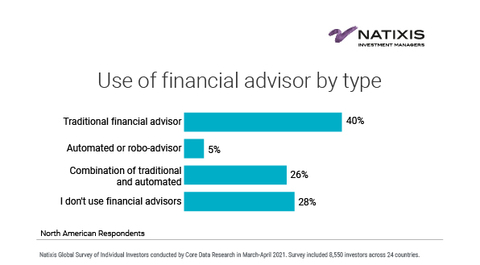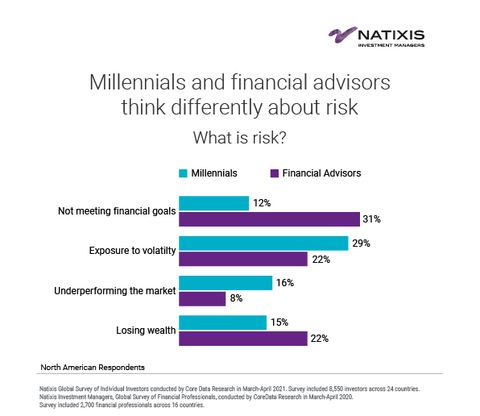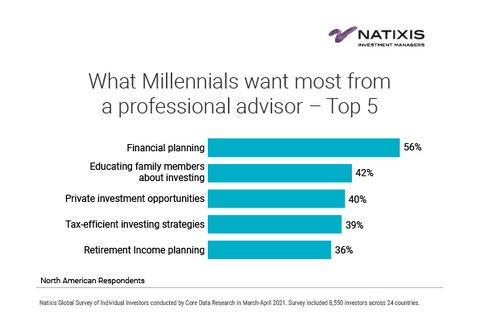BOSTON--(BUSINESS WIRE)--Millennials have grown up, and it turns out they are the financially disciplined, focused and responsible adults in the room, according to new survey findings published today by Natixis Investment Managers (Natixis IM). The oldest members of the generation born between 1981 and 1996 are now in their 40s, and they are entering their peak earning years with financial means and maturity that should bode well for them and an unexpected ally in their success: Financial advisors.
Natixis IM surveyed nearly 2,500 Millennials around the world, including 275 in North America with minimum investable assets of $100,000. The North American findings presented here are a subset of the larger survey and closely mirror global trends presented in Natixis IM’s report Five Financial Truths about Millennials at 40.
In contrast to the stereotype of Millennials as entitled beneficiaries of their parents’ wealth and poorly prepared idealists with trust issues, Natixis IM found:
- 72% of Millennials surveyed in North America have a professional financial advisor – a higher percentage than either Generation X (66%) or Baby Boomers (70%).
- Financial planning is the professional advice they are most interested in, no doubt to help them reach what 83% of Millennials say are clear financial goals, including retiring at age 59.
- They are diligent savers, putting aside 19% of their income for retirement, on average.
- They have worked to accumulate considerable wealth so far, the source of which 36% attribute to business ownership or self-employment income and 42% say comes from investing. Just 12% cite receipt of an inheritance or family money as a source of their wealth.
“Millennials have high expectations, but they also are proactive when it comes to planning,” said Dave Goodsell, Executive Director of the Natixis Center for Investor Insight. “This generation has enjoyed a long bull market with low interest rates and little inflation for much of their adult lives. They also saw how 9/11, the tech bubble, and the global financial crisis crushed many in their parents’ generation. They’ve known what loss looks like and want to protect their interests as they see risks rise and their finances grow more complex. The good news is that Millennials not only recognize the value of advice, but they trust their financial advisors almost much as they trust themselves.”
Natixis IM’s research findings reveals these five truths about Millennials at 40:
1. Algorithms can’t answer every financial question
The majority (66%) of Millennials work with a traditional advisor, or person, either solely (40%) or in combination with automated advice such as a robo advisor (26%). Just 5% solely rely on automated advice. While 53% prefer to receive financial advice through digital or online channels, Millennials want to know a person is on the other end. When it comes to making investment decisions:
- 46% of Millennials don’t trust algorithms or artificial intelligence, including 50% of younger Millennials (those between the ages of 25 and 32) and 44% of those who are older.
- 92% say they trust their financial advisor.
Seventy-nine percent of Millennials consider time spent with an advisor important to their long-term financial success. They cite the three most important facets of the relationship as: (1) helping manage volatility; (2) discussing financial planning with family; and (3) having someone who listens. Their three top financial fears now are: market volatility, tax increases, and slow economic recovery.
2. Risk is real when there’s more on the line
Nearly half of Millennials (48%) say that risk management is the most important factor they consider when selecting investments. They assess risk in a variety of ways, but most commonly define it as market volatility. Volatility also ranks highest on their list of investment concerns. While 75% understand that sudden market swings of 10% are a normal occurrence, 57% think volatility undermines their ability to reach financial goals and 70% also see it as an opportunity to grow their wealth.
Just 12% of Millennials define risk as not meeting their financial goals, in contrast to financial advisors who say this is the primary way they talk about risk with their clients, according to previously published Natixis IM research.1 Another 15% of Millennials think of risk as losing money. At the same time, many Millennials see risk as missing out, such as underperforming the market (16%), having too much money in cash positions (10%) and missing out on potential investment returns (10%).
“The way Millennials understand risk matters because it guides investment decisions and return expectations,” added Dave Goodsell. “Despite high annual return expectations of 18.2% above inflation, Millennials may be more risk-averse than they let on and more exposed than they know.”
The survey found:
- Even though 69% of Millennials say they are comfortable taking risks to get ahead, 75% would choose preservation over outperformance as an investment objective.
- While 82% understand that passively managed index funds will deliver market returns, about three-quarters are under the impression that index funds are less risky (74%) and will help minimize losses (77%), despite the fact that there is no inherent risk management built in.
3. Millennials understand they don’t have to sell out to be a capitalist
Millennials view wealth as an extension of their values, and 76% think of investing as a way to make a positive impact in the world. After risk, the second most important consideration Millennials make when selecting investments is whether investments match their values.
Four in ten (40%) of Millennials currently have investments that incorporate environmental, social or governance (ESG) factors. Another 46% don’t, but they are interested. The biggest barrier is not knowing enough about them.
The survey found that Millennials are primed to do well while doing good, yet they also are pragmatic:
- They invest in ESG because they want to help make a better world (41%). They are as likely to say their motivation is to open up new investment opportunities (40%) and because they just think it’s a better way to invest (39%).
- 59% recognize that investing in index funds exposes them to companies that don’t always match their values.
- While 72% of Millennials feel a personal responsibility to address big issues in the world, even more believe the responsibility also belongs to companies (79%) and governments (81%).
4. Retirement feels a lot closer at 40
Millennials hope to retire by the age of 59, on average. It’s an ambitious goal and they are aware of the risks, which may explain the importance they place on planning and advice.
The survey found:
- 67% expect inflation to be one of the biggest risks to their financial security.
- 61% accept that they may need to keep working longer than they anticipated.
- 56% worry the cost of healthcare will severely affect their financial security in retirement.
- 50% accept that may never have enough money to retire.
- 46% say that their financial security in retirement is going to take a miracle.
5. The pandemic served as a reminder of financial basics
Nearly half (47%) of Millennials say they felt stressed about their financial security during the pandemic. The experience may have further reinforced for them the value of professional advice. They say the greatest value advisors provided was by helping them better understand their whole financial picture and preventing them from making emotional investment decisions.
In retrospect, they say the pandemic served as a reminder of basic financial lessons, including the importance of having an emergency savings account (49%), keeping their spending in check (49%) and having a will and estate plan (32%).
A full copy of the global report on Millennials can be found here.
This material is provided for informational purposes only and should not be construed as investment advice. There can be no assurance that developments will transpire as forecasted.
Methodology
Natixis Investment Managers surveyed 275 Millennials in North America as part of a larger study of 2,459 Millennials across North America, Latin America, Asia, the UK, Europe and Middle East. Data were gathered in March and April 2021 by the research firm CoreData, with additional analysis conducted in March 2022 by the Natixis Center for Investor Insights.
About the Natixis Center for Investor Insight
The Natixis Center for Investor Insight is a global research initiative focused on the critical issues shaping today’s investment landscape. The Center examines sentiment and behavior, market outlooks and trends, and risk perceptions of institutional investors, financial professionals and individuals around the world. Our goal is to fuel a more substantive discussion of issues with a 360° view of markets and insightful analysis of investment trends.
About Natixis Investment Managers
Natixis Investment Managers’ multi-affiliate approach connects clients to the independent thinking and focused expertise of more than 20 active managers. Ranked among the world’s largest asset managers1 with more than $1.4 trillion assets under management2 (€1.2 trillion), Natixis Investment Managers delivers a diverse range of solutions across asset classes, styles, and vehicles, including innovative environmental, social, and governance (ESG) strategies and products dedicated to advancing sustainable finance. The firm partners with clients in order to understand their unique needs and provide insights and investment solutions tailored to their long-term goals.
Headquartered in Paris and Boston, Natixis Investment Managers is part of the Global Financial Services division of Groupe BPCE, the second-largest banking group in France through the Banque Populaire and Caisse d’Epargne retail networks. Natixis Investment Managers’ affiliated investment management firms include AEW; AlphaSimplex Group; DNCA Investments;3 Dorval Asset Management; Flexstone Partners; Gateway Investment Advisers; Harris Associates; Investors Mutual Limited; Loomis, Sayles & Company; Mirova; MV Credit; Naxicap Partners; Ossiam; Ostrum Asset Management; Seeyond; Seventure Partners; Thematics Asset Management; Vauban Infrastructure Partners; Vaughan Nelson Investment Management; and WCM Investment Management. Additionally, investment solutions are offered through Natixis Investment Managers Solutions and Natixis Advisors, LLC. Not all offerings are available in all jurisdictions. For additional information, please visit Natixis Investment Managers’ website at im.natixis.com | LinkedIn: linkedin.com/company/natixis-investment-managers.
Natixis Investment Managers’ distribution and service groups include Natixis Distribution, LLC, a limited purpose broker-dealer and the distributor of various U.S. registered investment companies for which advisory services are provided by affiliated firms of Natixis Investment Managers, Natixis Investment Managers S.A. (Luxembourg), Natixis Investment Managers International (France), and their affiliated distribution and service entities in Europe and Asia.
1 Cerulli Quantitative Update: Global Markets 2021 ranked Natixis Investment Managers as the 15th largest asset manager in the world based on assets under management as of December 31, 2020.
2 Assets under management (“AUM”) of current affiliated entities measured as of December 31, 2021 are $1,416.3 billion (€1,245.5 billion). AUM, as reported, may include notional assets, assets serviced, gross assets, assets of minority-owned affiliated entities and other types of non-regulatory AUM managed or serviced by firms affiliated with Natixis Investment Managers.
3 A brand of DNCA Finance.
4714770.1.1
1 2020 Natixis Investment Managers Global survey of Financial Professionals (cut of 450 financial advisors in North America).






